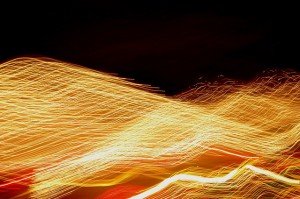Faster Than Light: A Guest Post
I recently had occasion to e-chat with Rocky Kolb, a well-regarded astronomer and astrophysicist at the University of Chicago. Talk turned, of course, to the recent likely discovery of the Higgs boson — but, as Kolb talk about that, he raised an even broader and more interesting point about scientific discovery.
He was good enough to write up his thoughts in a guest blog post that I am pleased to present below:
Faster Than Light
By Rocky Kolb
After the news coverage of the past week, everyone now understands what a Higgs particle is, and why physicists were so excited about the July 4th announcement of its probable discovery at CERN, a huge European physics accelerator laboratory. (The disclaimer “probable” is because it could turn out that the new particle seen at CERN is not the Higgs after all, but an imposter particle with properties like the Higgs.)
For a few days it was common to see, hear, or read my colleagues struggling to explain why the discovery of a Higgs particle is a triumph for science. But after a week of physics in the news, the media has moved on to cover the Tom Cruise–Katie Holmes divorce and shark sightings near beaches. Perhaps all the public will be left with is a memory that there was a triumph for science. Science works: theories are tested and confirmed by experiment.
I think that the CERN Higgs discovery was, indeed, a triumph for science. However, the Higgs was not the only dramatic announcement at CERN in the past year. But the other dramatic result is something many physicists would rather forget.
Many of my friends at CERN are still terribly embarrassed about last year’s erroneous reports that neutrinos travels faster than light. The report was based on an announcement by an experiment known as OPERA, which measured how long it took particles known as neutrinos that were produced at CERN to travel to a detector in Italy. The experiment came to the very surprising conclusion that the neutrinos arrived 62 nano-seconds sooner than expected if they traveled less than the speed of light. This implied that if a neutrino and a photon (a particle of light) raced 454 miles from Geneva, Switzerland to L’Aquila, Italy, the neutrino would cross the finish line about 60 feet before the photon. It would not even be a photo-finish. This would have been an even greater discovery than the discovery of a Higgs particle. It would mean that Einstein was wrong—the velocity of light is not nature’s speed limit. Not many physicists thought the result could be right, even after the first check of the experiment seemed to confirm the result.
A second experiment checked the result and found that the neutrinos respect Einstein’s speed limit, and then a third. And a few months ago, experimentalists working on the original experiment discovered a loose cable (one loose cable among thousands in the experiment) that explained the faster-than-light result. Oops! The mistake was sufficiently embarrassing that the head of the experiment resigned as spokesperson, but still remained a member of the experiment and didn’t lose his job. He was not fired as some reports indicated.
Although many of my CERN colleagues thought it was an embarrassment, I think it was a shining moment for science. Physicists test our deepest held beliefs. Fundamental things, like “nothing travels faster than light,” are put to the test. We don’t take Einstein’s word for it. The final word is from experiments. Experiments are hard; it’s easy to make mistakes. And when exciting results are announced, they are checked, scrutinized, re-checked, and confirmed or refuted by other experiments. And when a mistake is discovered, it is not covered up, but admitted publicly. And then we learn something and go on to test other things. How many other endeavors in the world work this way?
My friends at CERN are worried that physicists lost credibility in the eyes of the public because of the “faster than light” stories. But I think the public is smarter than that and will understand the nuances. I hope so.


Comments